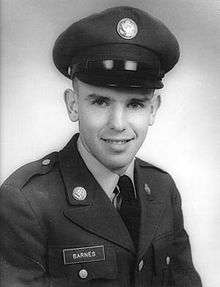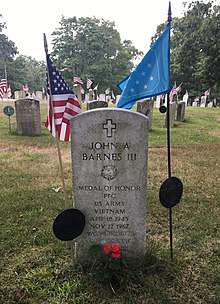John Andrew Barnes III
John Andrew Barnes III (April 16, 1945 – November 12, 1967) was a soldier of the United States Army during the Vietnam War. He was posthumously awarded the Medal of Honor for his actions during the Battle of Dak To.
John Andrew Barnes III | |
|---|---|
 | |
| Nickname(s) | "Jackie" |
| Born | April 16, 1945 Boston, Massachusetts, United States |
| Died | November 12, 1967 (aged 22) Dak To, Kon Tum Province, South Vietnam |
| Buried | |
| Allegiance | United States |
| Service/ | United States Army |
| Years of service | 1965–1967 |
| Rank | Private first class |
| Unit | Company C, 503rd Infantry Regiment, 173rd Airborne Brigade |
| Battles/wars | Dominican Civil War Vietnam War |
| Awards | Medal of Honor Bronze Star Medal Purple Heart |
Adopted as a child, Barnes joined the army after graduating from Dedham High School in 1964. After serving in the Dominican Civil War and completing a tour of duty in Vietnam, he volunteered to go back to the war. During his second tour, his unit came under attack during the Battle of Dak To. He was killed when he jumped on a grenade to save the lives of wounded comrades. For "conspicuous gallantry" that was "above and beyond the call of duty", Barnes received the Medal of Honor.
Early life and education
| Part of a series on |
| Dedham, Massachusetts |
|---|
 |
| History |
| People |
|
| Places |
| Organizations |
| Businesses |
| Education |
Barnes was born in Boston, Massachusetts on April 16, 1945.[1] When he was two years old, he was adopted by John A. Barnes, Jr. and his wife, Katherine (née Hermes).[2] Their 18-year-old daughter, Carson, was a freshman in college at the time.[1][3] From a young age, Barnes expressed an interest in joining the Army.[1]
As a child Barnes lived in Belmont before moving to Dedham during his sophomore year of high school.[3][4][5][lower-alpha 1] He wanted to leave Dedham High School early to become a Marine aviator, but his parents talked him into finishing.[5] He was graduated in 1964.[1][3][6] He was described by his sister as "an average student, quiet, and shy," as well as "very dedicated, very patriotic."[3] While in high school, he served in the Civil Air Patrol and drilled at the South Weymouth Naval Air Station.[7]
Career
Shortly after graduating from Dedham High School Barnes enlisted in the United States Army and went through basic training at Fort Pickett.[1][8] His sister was surprised he enlisted so soon after graduation, but said he "felt determined that it was the right thing to do."[3] Barnes also trained at the engineering school at Fort Benning.[3][4] He served for a year in Santo Domingo during the Dominican Civil War.[4]
Vietnam War
Barnes was dispatched to Vietnam as part of the 173rd Airborne Brigade on May 31, 1966, during the Vietnam War. Serving in Company C of the 1st Battalion, 503d Infantry, Barnes was assigned as a grenadier.[1][8] Soldiers of the brigade became involved in Operation Attleboro in fall of 1966, an operation that started out as a small search and destroy mission north of Saigon but eventually involved 22,000 troops from 21 battalions.[9] After serving a single tour Barnes was sent home, but volunteered to return to Vietnam and was sent back in the fall of 1967.[1][10] According to Barnes' sister, his mother was very upset that he had volunteered to go back.[3]
On November 12, 1967, while patrolling in Dak To District of Kon Tum Province during the Battle of Dak To, Barnes' unit was attacked by a North Vietnamese battalion. During the battle, Barnes manned a machine gun that had lost its crew to enemy fire and was credited with nine enemy kills.[5] While retrieving more ammunition, Barnes dived on top of a grenade that had landed among American wounded in order to use his body to protect them from the blast.[4][5] The grenade exploded, killing Barnes.[4][5]
Medal of Honor
Two years later, Barnes was posthumously awarded the Medal of Honor for his actions.[1][4][5][10] His parents accepted the award on his behalf from Spiro Agnew in the Vice President's executive office in Washington, D.C.[4][5] Carson and her husband, James Fleming, and the oldest four of their seven children also attended.[3][4] The ceremony also honored Fr. Charles J. Watters and Robert F. Stryker.[4]
Barnes was also awarded the Bronze Star Medal, Purple Heart, and several other medals.[4][10]
Citation
Rank and organization: Private First Class, U.S. Army, Company C, 1st Battalion, 503d Infantry 173d Airborne Brigade. Place and date: Dak To, Republic of Vietnam, November 12, 1967. Entered service at: Boston, Mass. Born: April 16, 1945, Boston, Mass.

Medal of Honor Official Citation reads:
For conspicuous gallantry and intrepidity in action at the risk of his life above and beyond the call of duty. Pfc. Barnes distinguished himself by exceptional heroism while engaged in combat against hostile forces. Pfc. Barnes was serving as a grenadier when his unit was attacked by a North Vietnamese force, estimated to be a battalion. Upon seeing the crew of a machine gun team killed, Pfc. Barnes, without hesitation, dashed through the bullet swept area, manned the machine gun, and killed 9 enemy soldiers as they assaulted his position. While pausing just long enough to retrieve more ammunition, Pfc. Barnes observed an enemy grenade thrown into the midst of some severely wounded personnel close to his position. Realizing that the grenade could further injure or kill the majority of the wounded personnel, he sacrificed his life by throwing himself directly onto the hand grenade as it exploded. Through his indomitable courage, complete disregard for his own safety, and profound concern for his fellow soldiers, he averted a probable loss of life and injury to the wounded members of his unit. Pfc. Barnes' extraordinary heroism, and intrepidity at the cost of his life, above and beyond the call of duty, are in the highest traditions of military service and reflect great credit upon himself, his unit, and the U.S. Army.[11]
Legacy

Barnes was buried in Brookdale Cemetery in Dedham, Massachusetts.[12] His name is inscribed on Panel 29E – Row 084 of the Vietnam War Memorial. Carson Barnes Fleming believed that the distress of the loss of Barnes contributed to the deaths of their parents in the years that followed.[3]
Within hours of learning that Barnes was to be awarded the Medal of Honor, a Blue Ribbon Commission was established by the Town of Dedham to make plans for a "John A. Barnes Memorial Day."[4][lower-alpha 2] The Dedham High School class of 1968 established a scholarship in his name.[5] On April 19, 1970, The Town of Dedham rededicated Memorial Field as John A. Barnes III Memorial Park.[10] At the ceremony, dignitaries, V.F.W. members from dozens of towns, and local marching bands proceeded to the intersection of East Street and Eastern Ave., where a marble monument was unveiled in Barnes' honor. Among the speakers that day was Congressman James A. Burke.[10]
A building used by the United States Navy, located at 495 Summer Street in Boston, was renovated and renamed for Barnes.[1][13] The street sign on Colwell Drive also now indicates that Barnes lived there.[1]
Notes
- He lived at 48 Peacedale Road in Belmont and 246 Colwell Drive in Dedham.[4]
- The Commission was chaired by Stan Embress, a member of the Veterans of Foreign Wars, Jacob Jones Post, the same post in Dedham that Barnes joined after his first tour of duty.[4] Also on the commission were the Town's three selectmen, Charles M. McGowan, Francis W. O'Brien, and Daniel P. Driscoll, as well as Edgar George, Ralph Timperi, John McMillian, Robert F.X. Casey, James McNichols, James Tansey, and James Cline.[4]
References
- Strakosch, Molly. "John Andrew Barnes III". Needham High School. Archived from the original on October 24, 2017. Retrieved October 24, 2017.
- "Barnes". The Boston Globe. November 21, 1967. p. 36. Retrieved September 6, 2019.
- "An Interview with Carson Barnes Fleming". The Dedham Times. November 10, 2017. p. 6.
- "Dedham Soldier Receives Posthumous Medal of Honor". The Dedham Times. November 10, 2017. p. 6.
- "Needham Man to Receive Medal of Honor for Son". The Boston Globe. November 4, 1969. p. 3. Retrieved September 6, 2019.
- Reflections. Dedham High School. 1964. p. 29.
- Brobst, Ronald F (June 24, 2012). "Ronald F Brobst Says:". Retrieved October 24, 2017.
- "Barnes, John A, III, PFC". Togetherweserved.com Inc. Retrieved October 24, 2017.
- Borch, Frederic R. (2004). Judge Advocates In Vietnam: Army Lawyers in Southeast Asia, 1959–1975. University Press of the Pacific. pp. 28–29. ISBN 978-1-4102-1772-1.
- Parr, James (May 31, 2010). "2 Dedham Heroes- John A. Barnes III & Henry Farnsworth". Retrieved October 24, 2017.
- "Medal of Honor recipients – Vietnam (A-L)". United States Army Center of Military History. August 3, 2009. Retrieved September 21, 2009.
- Cunningham, Timothy (2014). "Veteran's Monuments and Memorials in the Town of Dedham: Three Self-guided Walking Tours around Dedham" (PDF). Troop 1 Dedham, Boy Scouts of America.
- Crocket, Douglas S. (February 15, 1981). "The Fargo Building: it was no mystery to WWII sailors". The Boston Globe. p. 46. Retrieved September 6, 2019.
Further reading
- "Medal of Honor — Barnes, John". Mishalov.com. Retrieved March 18, 2007.
- "PFC John A. Barnes III". Medal of Honor recipients, 173rd Airborne Brigade. U.S. Army. Archived from the original on June 24, 2007. Retrieved March 18, 2007.